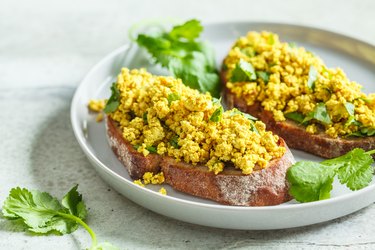
What you eat may directly affect aging well into your sunset years, and salmon is the perfect protein to eat more of for a long and healthy life.
While how long someone lives is influenced somewhat by genetics, 80 percent of what influences a lifespan is dictated by lifestyle, as found in the landmark 1996 study in Human Genetics, which looked at more than 2,500 twins from Denmark.
Video of the Day
Video of the Day
The longest-living people often have several things in common. Healthy social circles, strong family units and communities, healthy stress coping mechanisms, purpose, movement and a diet made up of mostly plants with fatty fish up to three times per week are all common denominators in the Blue Zones (areas in the world where people live the longest), per an October 2016 report in the American Journal of Lifestyle Medicine.
The Benefits of Salmon for Longevity
"Salmon has a great resume: It's a great source of protein, low in saturated fat, source of zinc, selenium, iodine and vitamin D," says Shyamala Vishnumohan, PhD.
One 3-ounce serving of cooked wild Atlantic salmon has:
- Calories: 155
- Protein: 22 g
- Total fat: 6.9 g
- Carbohydrates: 0 g
- Iron: 0.9 mg, 5% of the Daily Value (DV)
- Potassium: 533.8 mg, 11% DV
- Phosphorus: 217.6 mg, 17% DV
- Zinc: 0.7 mg, 6% DV
- Selenium: 39.8 mcg, 72% DV
Salmon is an excellent source of omega-3 fatty acids, including eicosapentaenoic acid (EPA) and docosahexaenoic acid (DHA).
Three ounces of cooked wild Atlantic salmon has 1.22 grams of DHA and 0.33 grams of EPA, meeting 97 percent of the DV of omega-3s for people assigned male at birth and 141 percent of the DV for people assigned female at birth.
"Other fish with a similarly high omega-3 content include sardines and anchovies and some types of tuna; but, these can have a stronger taste and a higher mercury content respectively," says Sharon Puello, RD, CDN, owner of F.R.E.S.H Nutrition.
With the vitamins, minerals, protein and omega-3 fatty acids, it's no wonder salmon is one of the best proteins for longevity. Here's how eating it can help support a long and healthy life.
1. It Supports the Gut Microbiome
The omega-3s in salmon could have a direct effect on gut health. And a healthy and diverse gut microbiome benefits more than just your digestive system.
"Research has linked omega-3 intake with increased gut diversity and number of species of healthy microbes in the gut," Vishnumohan says. "These microbes produce short-chain fatty acids (SCFA) called butyrate, which is thought to play a protective role against diseases such as diabetes, heart disease, cancer and depression."
In one small study, adults with overweight and obesity who ate 26 ounces of salmon each week (that's around five 5-ounce portions) for eight weeks had significant changes in their gut microbiota compared to a control group who didn't eat fish, per October 2020 research in the European Journal of Nutrition.
One notable change was a decrease in bacteria in the Bacteroidetes class; people with type 2 diabetes actually have high levels of his bacteria.
Tip
The American Heart Association recommends eating two 3-ounce servings of fatty fish, like salmon, per week.
2. It Might Help Keep Your Memory Sharp
Eating DHA-rich foods, like salmon, can help your mind stay sharp and clear as you age. Getting enough DHA consistently over a long period of time is linked to improved memory, improved learning ability and reduced rates of cognitive decline, according to the Academy of Nutrition and Dietetics.
Alzheimer's disease results in irreversible brain damage and memory loss, and eating two 3-ounce servings of fish each week was linked to a 30 percent lower risk of Alzheimer's in an October 2021 review in Nutrition Reviews.
The researchers believe that omega-3 fatty acids may help preserve brain function with their anti-inflammatory effects, but the exact mechanisms are still unclear.
3. It's Linked to Lower Rates of Heart Disease
Adding salmon to your regular menu can help you get the inflammation-fighting omega-3s you need. "Many of us get a lot of omega-6 fats in our diet, but unless you're consuming fish regularly, your intake of omega-3 fats is likely significantly below where it should be," Puello says.
An imbalance of fatty acids with too many omega-6s and not enough omega-3s is associated with chronic inflammatory diseases like heart disease, according to an April 2012 article in the Journal of Nutrition and Metabolism.
Omega-3s aren't the only nutrient with heart-helping powers. "Salmon is also a wonderful lean protein source and is rich in selenium, which can protect the body from oxidative stress," says Melissa Mitri, RD.
Oxidative stress can cause the oxidation of low-density lipoprotein (LDL) cholesterol in the body, which is associated with plaque formation in the arteries, per a March 2016 article in the European Journal of Lipid Science and Technology. One 3-ounce serving of wild Atlantic salmon has 72 percent of the DV for selenium.
4. It’s Loaded With Longevity-Supporting B vitamins
B vitamins are essential to forming red blood cells and helping your body get and use the energy from the food you eat, per the National Library of Medicine. Salmon is an excellent source of B vitamins.
Here are the B vitamins in a 3-ounce portion of cooked wild Atlantic salmon:
- Thiamin (vitamin B1): 0.2 mg, 19% DV
- Riboflavin (vitamin B2): 0.4 mg, 32% DV
- Niacin (vitamin B3): 8.6 mg, 54% DV
- Pantothenic acid (vitamin B5): 1.6 mg, 33% DV
- Pyridoxine (vitamin B6): 0.8 mg, 47% DV
- Folate (vitamin B9): 24.7 micrograms, 6% DV
- Cobalamin (vitamin B12): 2.6 micrograms, 108% DV
When it comes to healthy aging, cobalamin (or vitamin B12) is an all-star nutrient.
"When B12 levels are low in the body it can contribute to increased risk for cancers, as well as changes in cognition, increased fatigue and impairment of balance, all of which can contribute to decreased movement and overall engagement in life," Puello says.
Tips For Buying Salmon
Salmon is an easy fish to cook at home and can be used in a variety of delicious dishes, but the first step is buying it.
- Farm-raised vs. wild-caught: While both wild-caught and farm-raised salmon have health benefits, many experts agree that wild-caught has a slight advantage. "Wild salmon is the most nutritious type of salmon, as it feeds off nutrient-rich algae," explains Mitri.
- What to look for: You can purchase salmon whole or in fillets. "When buying whole fish, do a spot check for clear eyes, red gills and shiny skin," Vishnumohan says. When buying fillets, she recommends doing a pressure test to make sure the flesh is firm and bounces back after lightly pressing on it with your fingertip.
Salmon Recipes for Longevity
While deep-fried fish may be a popular American dish, it's far from the healthiest way to cook salmon. Besides adding extra unnecessary fat, deep frying causes some of the nutrients in salmon to become depleted.
"When baked, almost all of the vitamin D is retained, while when fried in oil only about 50 percent of the vitamin D remains," Puello says.
Try one (or all) of these tried-and-true salmon recipes:
- American Journal of Lifestyle Medicine: "Blue Zones"
- Human Genetics: "The heritability of human longevity: a population-based study of 2872 Danish twin pairs born 1870-1900"
- USDA: "My Food Data"
- Nutrients: "Vitamin D in Wild and Farmed Atlantic Salmon (Salmo Salar)—What Do We Know?"
- National Institute of Health: "Omega-3 Fatty Acids"
- USDA: "Food Data Central"
- European Journal of Nutrition: "Effects of high intake of cod or salmon on gut microbiota profile, faecal output and serum concentrations of lipids and bile acids in overweight adults: a randomised clinical trial"
- The Academy of Nutrition and Dietetics: "Brain Health and Fish"
- Nutrition Reviews: "Fish intake, n-3 fatty acid body status, and risk of cognitive decline: a systematic review and a dose-response meta-analysis of observational and experimental studies"
- Journal of Nutrition and Metabolism: "Health Implications of High Dietary Omega-6 Polyunsaturated Fatty Acids"
- European Journal of Lipid Science and Technology: "Natural phenolic compounds protect LDL against oxidation"
- American Heart Association: "Fish and Omega-3 Fatty Acids"
- National Library of Medicine: "B Vitamins"


